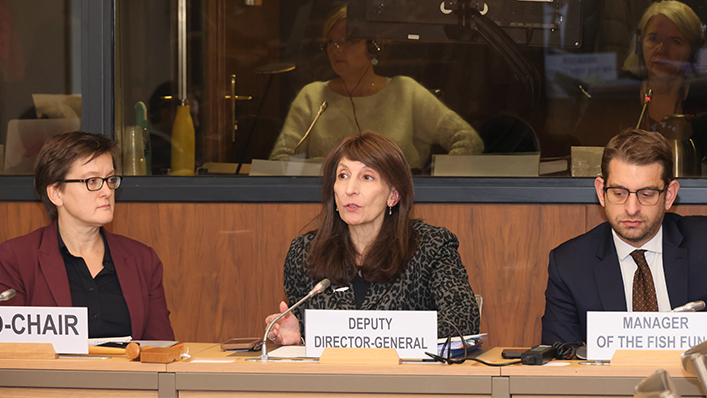
“The Fish Fund is now fully ready to become operational,” Deputy Director-General Angela Ellard said at the fourth Steering Committee meeting of the year. “Only 24 members have yet to deposit their instruments of acceptance of the Agreement on Fisheries Subsidies for it to enter into force. When that happens, the Fund will be ready to respond immediately to members’ needs,” she said
“I would like to express my sincere gratitude and appreciation to our Co-Chairs–the Netherlands, Nigeria, and Côte d’Ivoire–for their leadership and guidance in setting up the Fund during 2024. The idea of this Fund has grown tremendously in just two years, and it will continue to grow and make waves. I am confident that with continued commitment and cooperation from all stakeholders, it will have a significant impact,” DDG Ellard said.
Fish Fund Manager Jonathan Werner presented the 2025 workplan and budget at the meeting, noting that the main priority is to ensure the mechanism is operational, including the disbursement of funds.
“The workplan anticipates two calls for proposals in 2025, both contingent upon the Agreement entering into force,” he said, noting that the target set by the Steering Committee is to disburse US$ 2.5 million for each round.
The workplan also maps out Secretariat operations and management; partnerships, communications and outreach; and the roll-out of a Monitoring, Evaluation and Learning framework.
The Fund has received close to US$ 15 million, including signed contribution agreements. The members that have contributed to the Fund thus far are Australia, Canada, the European Union, Finland, France, Germany, Iceland, Japan, the Republic of Korea, Liechtenstein, the Netherlands, New Zealand, Norway, Portugal, Spain, Sweden, and most recently the United Arab Emirates. In addition, the United Kingdom has pledged GBP 1 million.
Because the new Agreement on Fisheries Subsidies will involve adjustments and enhancements to WTO members’ legislative and administrative frameworks, their transparency and notification obligations, and their fisheries management policies and practices, Article 7 of the Agreement provides for the creation of a voluntary funding mechanism to finance targeted technical assistance and capacity building to help developing and least developed country members with implementation.
For the Agreement to enter into force, two-thirds of members must deposit their “instruments of acceptance” with the WTO. Eighty-seven WTO members have formally done so; twenty-four more are needed for the Agreement to come into effect. Resources from the WTO Fish Fund will be available to members once they have deposited their instrument of acceptance.
The list of members that have deposited their instruments of acceptance is available here. More information on the Fund is available here.
Share
Reach us to explore global export and import deals